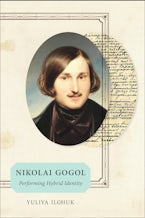"This innovative, multidisciplinary study of the life and work of Nikolai Gogol (1809–52) explores his complex identity as a nineteenth-century writer of Ukrainian origin who contradictorily achieved world renown as an icon of Russian literature."
K. Rosneck, University of Wisconsin-Madison, CHOICE
"Her approach is necessarily and wonderfully multidisciplinary, and one fully expects that Nikolai Gogol will appeal to scholars of Russian and Ukrainian literature, ethnicity and nationalism, and critical theory and the digital humanities in Slavic studies for years to come."
Nicholas Kupensky, US Air Force Academy, H-Net Reviews
"Ilchuk’s exploration of Gogol’s hybrid identity and language raises fascinating questions and provides profound insights, and her book is a valuable contribution to Gogolian scholarship. The issues and questions she raises provide fertile ground for additional scholarship, and that is a mark of a genuinely significant book."
Michael R. Kelly, Brigham Young University, Slavic Review
“It is hard to think what more this book could do. Devoted to the topic of identity in its dizzying complexity, it is theoretically sophisticated, clearly and engagingly written, methodologically bold, and rich in detail. Ultimately Ilchuk’s aim, in the best spirit of the theorists whose ideas she mobilizes, is not only to provide an objective analysis of an oeuvre, idiom, and life, but also to show its positive generative potential. She succeeds.”
Timothy Langen, University of Missouri, Modern Language Review
“Ilchuk’s study will appeal to scholars of Russian and Ukrainian literature as well as the growing subdiscipline of postcolonial studies within the Slavic field. Her conscientious application of computer-assisted analytical methods, as well as her detailed description of the digital platforms she used, will allow the monograph to serve as a case study for others eager to investigate tools from the Digital Humanities.”
Kathleen Scollins, University of Vermont, Pushkin Review
"Yuliya Ilchuk takes Gogol seriously as an astute and autonomous agent. This book is fresh and original and will open up new horizons in Gogol studies."
Susanne Fusso, Department of Russian, East European, and Eurasian Studies, Wesleyan University
"Yuliya Ilchuk’s knowledge of the history of Gogol’s texts and their editing, their language(s), and their reception(s) is truly impressive – she is one of very few specialists in these important and under-researched areas. Her book is a major contribution to our understanding of the colonial subject Gogol. It stands out from all the recent scholarly writing on Gogol, by Westerners and Slavs alike."
Robert Romanchuk, Department of Modern Languages & Linguistics, Florida State University
"This monograph is a timely contribution to the field of Gogol studies, and more generally, to scholarship on the so-called golden age of Russian literature as well as on colonial cultural and social conditions that shaped the development of modern Ukrainian literature. Yuliya Ilchuk provides a new approach to Gogol’s peculiar place in Russian literature – both central and marginalized, instrumental and subversive – that of cultural and linguistic hybridity."
Taras Koznarsky, Department of Slavic Languages and Literatures, University of Toronto

